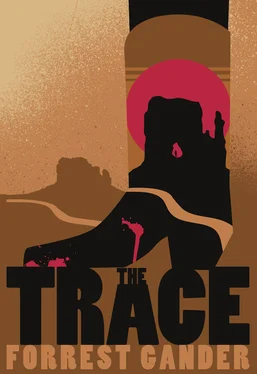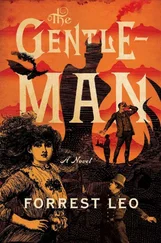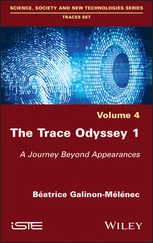Forrest Gander - The Trace
Здесь есть возможность читать онлайн «Forrest Gander - The Trace» весь текст электронной книги совершенно бесплатно (целиком полную версию без сокращений). В некоторых случаях можно слушать аудио, скачать через торрент в формате fb2 и присутствует краткое содержание. Год выпуска: 2014, Издательство: New Directions, Жанр: Современная проза, на английском языке. Описание произведения, (предисловие) а так же отзывы посетителей доступны на портале библиотеки ЛибКат.
- Название:The Trace
- Автор:
- Издательство:New Directions
- Жанр:
- Год:2014
- ISBN:нет данных
- Рейтинг книги:3 / 5. Голосов: 1
-
Избранное:Добавить в избранное
- Отзывы:
-
Ваша оценка:
- 60
- 1
- 2
- 3
- 4
- 5
The Trace: краткое содержание, описание и аннотация
Предлагаем к чтению аннотацию, описание, краткое содержание или предисловие (зависит от того, что написал сам автор книги «The Trace»). Если вы не нашли необходимую информацию о книге — напишите в комментариях, мы постараемся отыскать её.
The Trace — читать онлайн бесплатно полную книгу (весь текст) целиком
Ниже представлен текст книги, разбитый по страницам. Система сохранения места последней прочитанной страницы, позволяет с удобством читать онлайн бесплатно книгу «The Trace», без необходимости каждый раз заново искать на чём Вы остановились. Поставьте закладку, и сможете в любой момент перейти на страницу, на которой закончили чтение.
Интервал:
Закладка:
“We were crawling up a low-ceilinged ramp between two mounds of dirt in this brick chamber. The air was suddenly completely different than it was in the steam tunnels. I don’t know how the change could come so quickly, but it was dry, really dry. I was sucking dust in Brady’s wake and my throat was coated and the back of my tongue. It was like we crawled out of a soup bowl into absolute bone-dry permanence. I couldn’t see well, but I could tell we were inside a vault about the size of a van, too low for us to stand up all the way. I could hear Brady striking a match and then I caught a quick flash of two brick crypts in front of us. And I could see there was no door, no other way in or out. Then the flare shrunk into a small steady flame that blinked out after a few more seconds and we both stood up hunched over.
“When Brady talked, his voice sounded weird and shaky. I knew it was the drugs, but I was spooked anyway. He said he thought this was Lord Botetourt’s tomb maybe. And he struck another match. All my energy was draining out as if I were caught in an undertow. I fought against it enough to step up to the crypt when Brady lit a third match. I was looking for markings, I tried to see inside, I didn’t quite know what I was doing. I didn’t see anything particular. There wasn’t any particularity anymore. And I realized that in the steam tunnel, there had been the noise of steam in the pipes and the echo of our steps and our breathing and here there was no sound. No moisture, no sound, no light, no air, no life. Brady was completely mute and I couldn’t hear him thinking anymore. I was sure his thoughts and mine had been obliterated by — by the close presence of death. Which is no presence at all. A vacuum. It sucked at us so hard, we couldn’t leave.
“I remember both of us sitting there, about six or eight feet between us, swallowing up the defunct air, the superfine dust contaminated by death, while it ate into our vitality. I’d heard about bad trips, and I was vaguely conscious of trying to modulate the feeling inside me to keep from going blacker, but I couldn’t. I was alone with death. And Brady too. And death had nothing at all redemptive. No sense of being part of a cycle. Or a process. Or the mother of beauty, any of that. It was the end. It went nowhere. The dusty air smelled like our lives blown out, and the smell was all over us.”
For a while, Hoa didn’t say anything. They were passing an old house in disrepair on the side of the road, its adobe weathered away to reveal clods of clay. The concrete lintel above the door was exposed too, and thin wooden spouts extended from the parapet — maybe a water line had been roughed in, she wasn’t sure. Then it was behind them, and she wondered who had lived there and what happened to them. She didn’t like it when Dale talked about death.
Dale took a deep breath, drawing himself out of his story back into the sun-bleached present where he adjusted the bridge of his sunglasses. Where did he think he was going with that, anyway? That was the wrong tale to tell. Like she really needed to hear something bleak. Idiot.
Hoa looked out the side window. She asked the desert if she would ever feel normal again. Would she start to get some traction in her life?
“How’s the gas,” she asked, still facing away from him.
“We’re okay.”
“You want me to drive?”
Dale thought about Hoa’s driving. She would doggedly commit herself to the slow lane, following the slowest of the slow cars with no impulse to pass even if she were going forty in a sixty-five zone. Just the same, he wouldn’t mind taking a break. He could make some better conversation and maybe read to her a little from Alone in Bad Company, the Morris biography of Bierce.
“Maybe next stop,” he answered.
“You ever take those seeds again?”
A bird flying fast and low from Hoa’s side slammed the middle of the windshield. Dale hit the brakes and simultaneously checked his rearview mirror. A truck about half a mile behind him.
“What was it?” Dale asked.
Hoa’s crossed sock feet came out from under her and she sat forward in her seat, the seatbelt jerking taut across her. On the windshield she could see two white marks the size of quarters where the bird’s breast had exploded.
Dale slowed after the impact, but now he was accelerating again.
“It was a whip-poor-will,” she said, the image frozen and precise in her mind, as though the impact had lasted a whole minute.
“It was a whip-poor-will,” she repeated. “They usually aren’t even out in the daytime.”
“Don’t take it as a sign,” Dale said.
* * *
Two weeks earlier, Hoa had asked Dale, “Do you want me to come with you? On your trip?” Dale was on his way to the kitchen to fill up his thermos with coffee and drive to the university. He turned back toward her.
“Sure,” he said. “If you want to.” He thought about what that might be like. “I’m just afraid you’d be bored. I’m going to be packing a lot of research into a few days. It wouldn’t be exactly like a vacation for you.”
“You didn’t invite me,” Hoa said. “It’s alright if you want to go alone.”
Sitting on the couch in her Drive-By Truckers T-shirt and dark-blue stretch pants, her novel on her lap, she looked pouty. He could tell she was trying to read his body language where he stood in the doorway.
“I’d love to have you come if you want to,” he said, squaring up. “I hadn’t thought about it because it’s just going to be driving around in the desert. And it’s summer, so it’ll be stupendously hot. I’ll just be poking into these towns where Ambrose Bierce went or where someone claimed to have seen him.”
“I’d be game,” she said. She squeezed the contact from her left eye, placing it on the tip of her tongue to clean it, then balanced it on her forefinger and put it back in her eye. It always unnerved Dale when she did that.
“It’s not the Mexico you like,” he said.
“It’s not the Mexico I’ve been to before,” she answered.
Her cellphone rang from her purse and she bent over to dig it out, checking the caller ID. She dropped the phone back in her purse, still ringing, and resumed her position. There was a stack of books on the floor by her purse. Dale was a reader, but Hoa out-read him about three to one: novels, science, field guides, poetry, art books. Most of the best books he’d read over the years — aside from what he read as part of his job — were her suggestions.
Dale took a step into the living room. On a table, under the reading lamp, there was a photograph of all of them: Hoa, Dale, and Declan at about eight years old, taken in front of a cracked concrete wall in Cancun. The ocean was in the background, an unreal turquoise.
“Well,” he said, “come then. I’d love the company.”
She looked down at her novel, saying, “I could help you identify plants and birds and things. We might come across some ceramics.”
“Yeah,” he said. “I’m not sure how useful that’ll be for an Ambrose Bierce book, but you’d make it more interesting for me.”
“Definitely would,” she said. She pushed her book forward, then she stretched out on the couch on her stomach, her legs behind her bent up at the knees, her feet waving in the air.
He took another step toward the couch, deciding. She was eyeing her open page again and her legs were wagging slowly back and forth, her pants tight across her butt. Now she was looking up at him again.
“Yeah, come then. As long as you’re not going to be bored.”
“I love Mexico,” Hoa said. Her phone had stopped ringing in her purse on the floor, but now it beeped, letting her know the caller left a message.
“Okay, we’re on.”
Читать дальшеИнтервал:
Закладка:
Похожие книги на «The Trace»
Представляем Вашему вниманию похожие книги на «The Trace» списком для выбора. Мы отобрали схожую по названию и смыслу литературу в надежде предоставить читателям больше вариантов отыскать новые, интересные, ещё непрочитанные произведения.
Обсуждение, отзывы о книге «The Trace» и просто собственные мнения читателей. Оставьте ваши комментарии, напишите, что Вы думаете о произведении, его смысле или главных героях. Укажите что конкретно понравилось, а что нет, и почему Вы так считаете.












